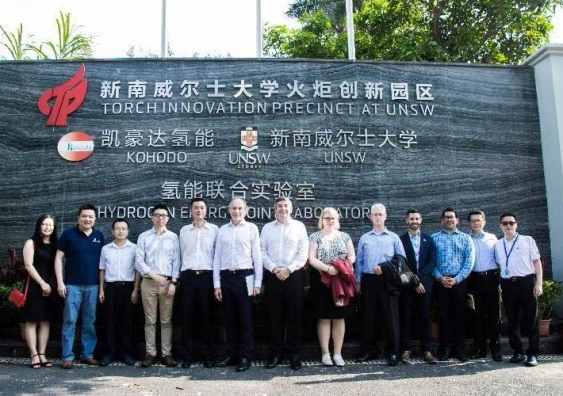Dr Alan Finkel toured the joint UNSW-Kohodo Hydrogen Energy Laboratory in Shenzhen and touted the ground-breaking work of researchers in developing cost effective and efficient hydrogen energy.

Australia's Chief Scientist Dr Alan Finkel visited the joint UNSW-Kohodo Energy Hydrogen laboratory in Shenzhen, China, earlier this month. Researchers from UNSW Sydney and Kohodo are developing cost-effective and efficient hydrogen energy.
Australia's top scientist visited one of UNSW Sydney's most important research and development laboratories in China this month where world-leading advances in hydrogen technology are being developed.
Chief Scientist Alan Finkel toured the joint UNSW-Kohodo Hydrogen Energy Laboratory in Shenzhen, marking the first time the federal government's Chief Scientist has visited a UNSW research and development facility. The visit supported the work of UNSW and Kohodo researchers who are working together to develop hydrogen as a clean and efficient alternative energy carrier to fossil fuels.
Kohodo Energy is a foundation partner in UNSW's Torch Innovation Precinct. In late 2018, Kohodo and UNSW opened the joint research laboratory in Shenzhen and signed an agreement to develop hydrogen technologies, valued at more than $3 million over three years. Led by Professor Chuan Zhao in the School of Chemistry, the UNSW team with Kohodo Hydrogen is developing low cost high efficiency catalysts for water electrolysers and fuel cells.
Clean fuel, many uses
Hydrogen is a clean fuel source that produces zero emissions and can be used as an alternative to fossil fuels in cars, trucks, trains and ships, for electricity storage and generation as well as home and industrial uses. In addition to developing the hydrogen fuel source, the joint lab is also constructing the first hydrogen refuelling station with on-site hydrogen generation in Shenzhen.
Professor Zhao, a professor of chemistry at UNSW who participated in the event, said Dr Finkel's visit was timely and an important show of support from one of the world's leading advocates for hydrogen energy.
"Dr Finkel has a broad global view and influence on hydrogen technology, and it is good to have someone of his importance show interest in the work you are doing," Professor Zhao said. "He was excited with the developments and improvements we have made in energy efficiency and cost reductions."
A new enthusiasm for hydrogen
Last year, Dr Finkel released a white paper emphasising the economic and environmental benefits of investing in hydrogen energy, based on Australia's enormous potential for wind and solar energy. Although the hydrogen economy has been considered since the early '70s, Dr Finkel says the time is now for the alternative energy source, due in large part to Japan's "commitment to be a large-scale enduring customer, and the hundredfold reduction in the price of solar electricity in the past four decades".
In addition, Professor Zhao said the environmental perspective and the effects of climate change were now driving the push for cleaner energy sources and Australia was the perfect place for hydrogen production.
"The traditional way of making hydrogen used natural gases, which Australia has a lot of," Professor Zhao said. "But the old way gives off a lot of CO₂ emissions. The new way uses clean electricity to split water into hydrogen. Australia has an abundance of solar and wind resources and we have large pieces of land full of sunshine - it is perfect for doing that."
Setting the pace in hydrogen technology
For the most part, the wide-scale use of hydrogen energy has been hampered by expensive and inefficient methods for generation, storage and transportation. But Professor Zhao said Australian research, particularly from UNSW and Kohodo, was setting the pace for developing cost-effective and energy efficient technologies to not only create hydrogen fuel, but to also store and utilise the product.
"We are trying to make this technology cheaper because currently the industry in this sector is very expensive. We are trying to reduce the cost by developing a low-cost catalyst and improve the efficiency of the catalyst to reduce the overall cost of hydrogen," Professor Zhao said.
"Our work aligns with Dr Finkel's vision for hydrogen energy in Australia and he was excited that someone is making it happen. That makes you feel good and that you are doing something significant."






